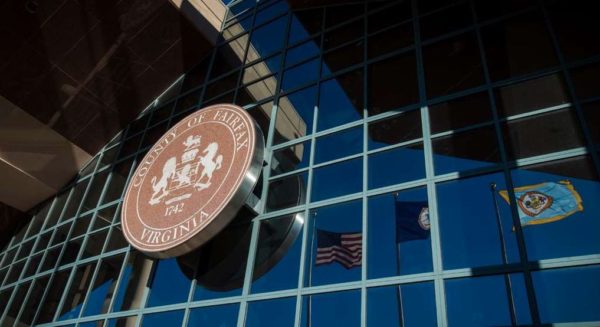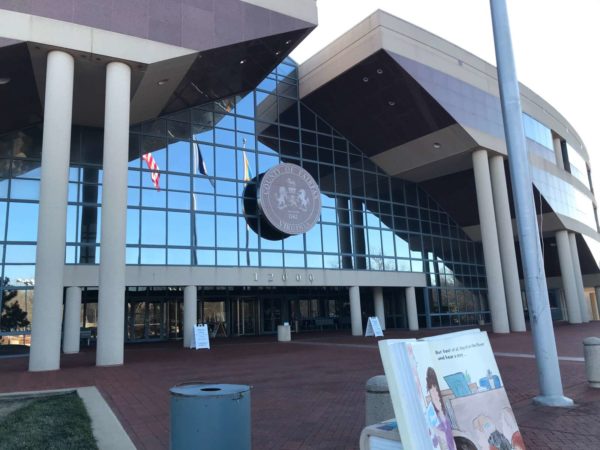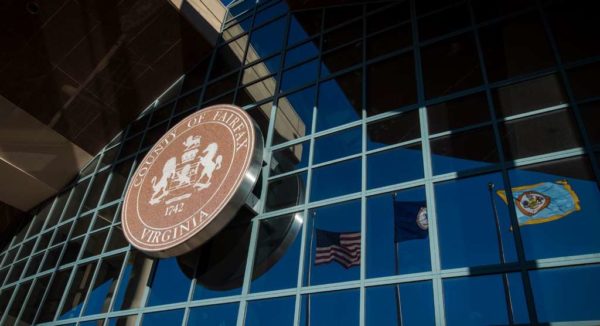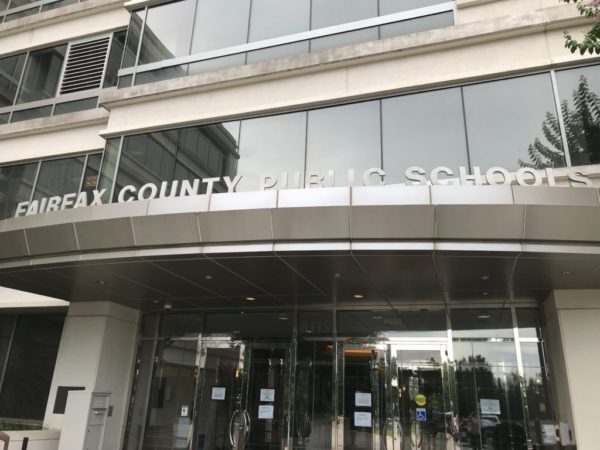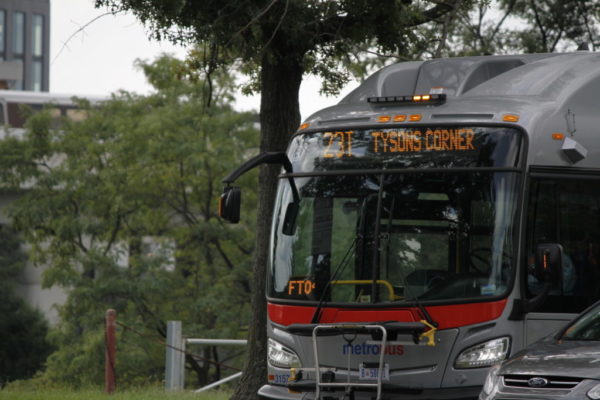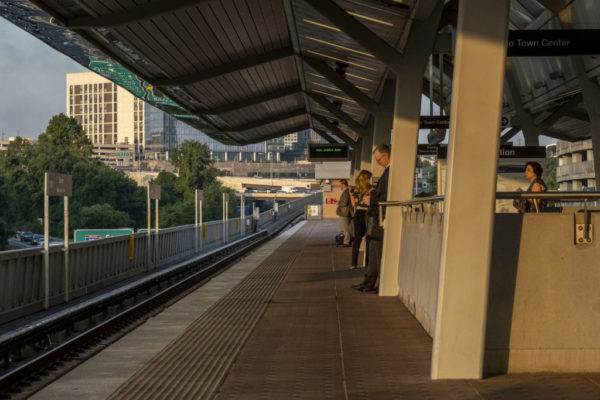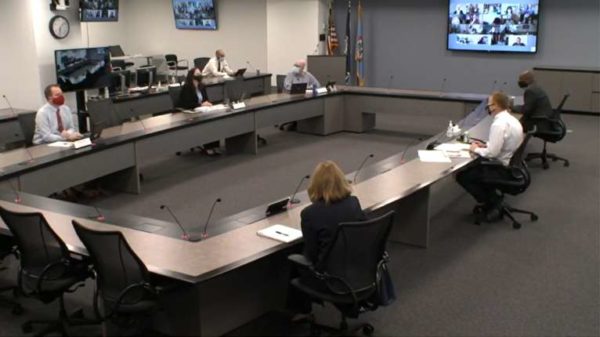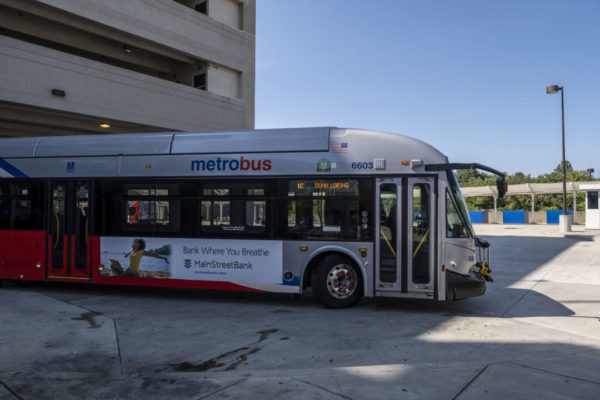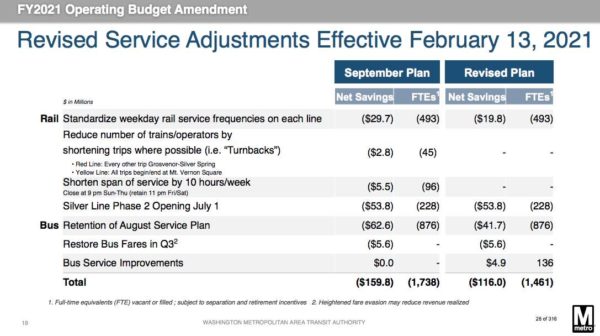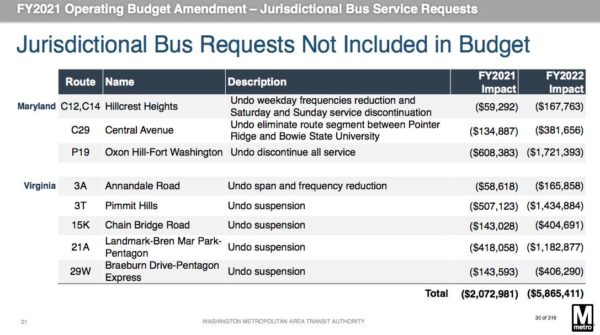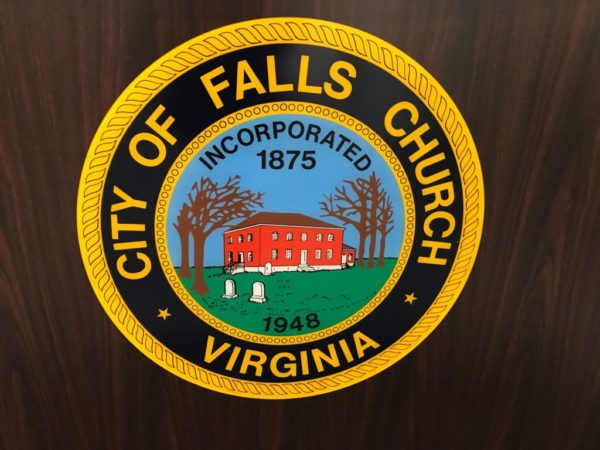(Updated at 11:05 a.m. on 1/29/2021) Fairfax County should provide hazard pay to all local government workers, a union that represents more than 2,000 general county employees argues.
The county is currently considering a proposal to provide a one-time $1,500 hazard pay bonus to workers who are at high risk of exposure to COVID-19. Staff say about 4,000 employees would be eligible for the benefit.
However, SEIU Virginia 512 — the Fairfax County government employees’ union — says the bonus should be available to all workers, because they have all taken risks and been forced to adapt so the county can keep providing essential services during the pandemic.
As of yesterday (Wednesday), a petition urging Fairfax County supervisors to extend $1,500 hazard pay bonuses to all staff has been signed by nearly 1,000 workers, with more signatures expected to come, according to SEIU Senior Communications Specialist Rachel Mann.
“We’ve all been impacted by what’s going on. Whether we are doing our assigned work or not, we are still working,” SEIU Virginia 512 Executive Board President Tammie Wondong said. “…We are continuing to keep Fairfax County running. Residents are being continually served. So, that’s why everyone needs to have hazard pay.”
The Fairfax County Board of Supervisors was initially scheduled to vote on the proposed plan on Tuesday (Jan. 26), but the decision was postponed after Chairman Jeff McKay asked staff to continue discussions with the union and other workers’ groups.
Under the staff plan, hazard pay would go to workers whose risk of being exposed to COVID-19 is rated “high” or “very high” by the Virginia Occupational Safety and Health (VOSH) risk assessment. It would also be limited to merit or career positions.
Fairfax County intends to pay for the bonuses using CARES Act Coronavirus Relief Funds. Federal guidelines, however, dictate that CARES Act money can only be used for hazard pay if an employee is performing duties that involve physical hardship related to COVID-19 response efforts.
In other words, localities must establish criteria for hazard pay eligibility to use CARES relief funds, Fairfax County Department of Management and Budget Director Christina Jackson told the board on Jan. 12.
The county could use its own funds to extend hazard pay to more workers, but McKay suggests employees should temper their expectations for the upcoming Fiscal Year 2022 budget.
“Based on the economic impacts of the ongoing pandemic, it will be challenging to address many of the Board’s priorities in the FY2022 [budget],” McKay said in a statement to Tysons Reporter. “The budget is still early stages and we are exploring what options are available, but it is unlikely we would have the resources to increase hazard pay funding in the next budget cycle.” Read More
Fairfax County workers whose jobs put them at high risk of exposure to COVID-19 could receive a one-time hazard pay bonus of $1,500 if county leaders approve a proposal put forward on Tuesday (Jan. 12).
Fairfax County Director of Human Resources Cathy Spage told the Board of Supervisors during its budget policy committee meeting that about 4,000 county employees would be eligible for the bonus, giving the proposal an overall estimated cost of $6.5 million.
If approved, the funds would come out of $10 million in CARES Act coronavirus relief money that the county had set aside earlier for hazard pay, according to Fairfax County Department of Management and Budget Director Christina Jackson.
“I think there’s a strong desire on the board to move forward with something,” Fairfax County Board of Supervisors Chairman Jeff McKay said. “I know there’s still some lingering debate on some pieces of this, but I think the principle here is one that is strongly supported.”
Under the county’s proposal, the hazard pay bonus will be available to workers whose exposure risk level is rated high or very high based on Virginia Occupational Safety and Health (VOSH) standards established by the Virginia Department of Labor and Industry.
Adopted on July 15, the VOSH COVID-19 risk assessment puts workers in very high, high, medium, and lower risk categories based on their work environment, their proximity to people known or suspected to be infected, their ability to maintain social distancing, and other factors.
The bonus will only be open to merit employees, because the lack of standard schedules for non-merit employees would make it “problematic” to include them, according to Jackson.
Several board members raised concerns about employees being excluded from getting hazard pay despite risking infection by the novel coronavirus as part of their job. For instance, the VOSH standard classifies school settings, restaurants, and construction sites as medium risk.
“There have been outbreaks on construction sites. We know that it happens,” Braddock District Supervisor James Walkinshaw said. “Based on what I’ve read of the VOSH medium-risk categories, some of them probably make sense. Some of them make me a little bit concerned in terms of how they’re categorizing folks.” Read More
Fairfax County will receive an additional $34 million to provide emergency rental assistance to residents experiencing economic challenges due to the COVID-19 pandemic.
During a budget policy committee meeting yesterday (Tuesday), Fairfax County Department of Management and Budget Director Christina Jackson told the county board of supervisors that the department has submitted a certification for the award, and the amount is expected to be confirmed today.
The money comes from a $25 billion emergency rental assistance program that the U.S. Treasury Department established using funds from the COVID-19 relief package that Congress passed at the end of December.
“This will be huge,” Fairfax County Board of Supervisors Chairman Jeff McKay said. “I know we feel good about it, but obviously, there are a lot of folks out there struggling, and this will be a great opportunity to help those folks.”
Under the treasury program, renters may be eligible to receive assistance if at least one or more people in their household has experienced financial hardship due to the pandemic, are at risk of experiencing homelessness or housing instability, or have a household income at or below 80% of the area median income.
Applicants can receive up to 12 months of assistance, with the possibility of an additional three months if needed to ensure housing stability and funds are still available.
The treasury is allocating the funds directly to states and local governments with more than 200,000 residents.
Jackson says the treasury is required to disperse all of the program funds by the end of January, so the county should have “dollars in hand” by the end of the month.
“We’re working with staff to try to incorporate this funding with other awards that we’ve received to make sure we’re using all the resources to our advantage,” Jackson said.
Because of the incoming grant, the Fairfax County Department of Management and Budget is recommending that the county increase its COVID-19 grants reserve by $50 million as part of its Fiscal Year 2021 mid-year budget review.
To offset anticipated revenue losses, the county plans to take $9.1 million out of a general fund reserve that the board of supervisors set up in May to support its coronavirus response efforts.
If the adjustment is approved, the COVID-19 reserve will have $16 million remaining, including roughly $12 million that the county mostly plans to use for Federal Emergency Management Agency reimbursements.
As part of the mid-year review, Fairfax County staff are also recommending that the county create 13 new positions in the health department to boost its pandemic response, especially when it comes to the COVID-19 vaccination program. The positions would be initially covered by federal stimulus funds.
“We’re in constant contact with the health department relative to the continuous pivoting in response to COVID,” Fairfax County Chief Financial Officer Joe Mondoro said. “There are a number of other activities that they’re undertaking to respond to…whether that’s the need for additional contact tracers, whether that’s the escalation of the vaccination requirements.”
The board of supervisors will hold a public hearing and take action on the FY 2021 budget mid-year review when it meets on Jan. 26.
Photo via Fairfax County government/Facebook
Fairfax County Public Schools Superintendent Scott Brabrand is asking for a $3.1 billion budget for the 2022 fiscal year that focuses “on the most pressing needs” of the school system.
He presented the nearly level-services budget — “a modest request” with an approximately $400,000 increase — to the county school board last Thursday (Jan. 7).
The proposed budget requests a $42.7 million increase in transfer funds from the county government to pay for new preschool special education classes, retirement rate increases, and rising health care costs, which would patch over a gap created by drops in county and state revenue due to the COVID-19 pandemic.
“As all of you know, the COVID-19 pandemic has impacted FCPS, our students, families, and staff in ways we couldn’t have imagined,” Brabrand said during the meeting. “I have designed a budget to meet the educational and social-emotional needs of our children so they can continue to learn and grow despite the challenges of the past year.”
The proposed budget includes money for distance learning, including cybersecurity protection and Zoom, which will replace Blackboard for web-conferencing, he said.
The budget does not contain compensation increases for most employees, though there is $3 million to finish a three-year initiative to increase the salaries of instructional assistants and public health training assistants.
In December, Virginia Gov. Ralph Northam outlined a state budget for schools that features a one-time, 2% bonus for teachers and support staff, with the potential for the salary boost to become permanent. But Brabrand said Fairfax County is opting out because it cannot afford to participate.
The burden would be on Fairfax County to match state funds with $32 million in county-level funding, he said.
“We understand that [FCPS] kept everybody whole,” Fairfax Education Association President Kimberly Adams said. “But many staff see it as a slap in their face.”
In comparison, Prince William County offered compensation increases in its budget last year, and Loudoun County’s proposed budget for the upcoming fiscal year includes money to cover compensations that were frozen last year, she said.
“If Loudoun and Prince William moved two steps ahead of Fairfax, we’re behind,” she said. “People are already irritated. This is a potential reason to leave.”
The lack of compensation particularly hurts Virginia teachers, who have the largest teacher wage penalty in the country at 32.7%, Fairfax County Federation of Teachers President Tina Williams said.
“We’re disappointed that the FCPS proposed budget does not include a pay increase for school employees, especially after a year that is the hardest in their career,” she said in a statement. “We urge FCPS to demonstrate it values the hard work and dedication of its employees by providing wage and cost of living adjustments to help keep employees whole.”
The Fairfax County School Board will hold a work session to discuss the proposed budget tomorrow (Tuesday). A public hearing has been scheduled for 6 p.m. on Jan. 26, though it could carry over to Jan. 27 if needed.
The school board will adopt its advertised budget on Feb. 18 and present it to the Board of Supervisors on April 13. A final approved budget is scheduled to be adopted on May 20.
Metro will start collecting fares from bus riders again on Jan. 3 as part of its pandemic recovery plan, the Washington Metropolitan Area Transit Authority announced yesterday (Thursday).
The WMATA board of directors authorized a temporary suspension of Metrobus fare collections in March as part of a policy prompted by the COVID-19 pandemic that required riders to board buses through the rear doors in an effort to reduce contact between passengers and drivers.
With fare collections resuming, bus riders should return to entering the vehicles from the front, where the farebox and SmarTrip equipment are located.
WMATA says the change in policy is enabled by the more robust public health procedures that it has put in place now that there is a better understanding of how the novel coronavirus is transmitted.
“With everyone wearing masks, shields for operators on every bus, and enhanced daily cleanings, front-door boarding is safe, expands our capacity for more riders, and helps us resume some normalcy,” Metro General Manager and CEO Paul Wiedefeld said. “We also need to collect fares from every rider to keep essential Metro transit employees working and continue to provide essential service.”
Metrobus costs $2 per trip, which is payable in cash or with a SmarTrip card. Metro also offers a seven-day bus pass for $15 that provides unlimited access to Metrobus and other local bus services, including the Fairfax Connector.
The plan to resume collecting bus fare comes as Metro threatens to make significant service cuts after plummeting ridership during the pandemic contributed to a projected deficit of nearly $500 million for Fiscal Year 2022.
The dilemma facing Metro is shared by other major transit systems around the country, leading local elected leaders and transportation officials to call for the inclusion of public transit funding in a federal coronavirus relief package currently under negotiation in Congress.
Without outside support, WMATA could close 19 stations, drastically reduce rail and bus service hours and routes, and eliminate 2,400 additional jobs. The impact of those cuts is expected to land hardest on low-income residents and other populations that depend on transit.
Metro’s proposed FY 2022 budget will be up for public comment early next year.
Updated on 12/2/2020 — The McLean Metro Station is one of 19 stations that would close if the Washington Metropolitan Area Transit Authority adopts a new budget proposed for Fiscal Year 2022.
The stations being considered for closure were identified based on low ridership levels or their proximity to another Metro station. They were all shut down earlier this year as part of Metro’s efforts to conserve resources during the initial days of the COVID-19 pandemic.
WMATA said on Mar. 24 that the McLean Metro Station only recorded 148 Metrorail trips the previous day, making it among the least frequented stations in the system.
The Greensboro Metro Station is also on the list for potential closure, since it is within less than a mile of the Spring Hill and Tysons stations.
The potential station closures are among several drastic cuts on the table as WMATA attempts to fill a nealry $500 million deficit in its upcoming budget.
Scheduled for discussion during the WMATA Board of Directors’ finance committee meeting on Friday (Dec. 4), the proposal also suggests eliminating all weekend rail service, limiting weekday train service to every half hour, and slashing bus service from 60 to 41 routes.
Under the proposal, Metro would offer an “affordable bare-bones service network to sustain essential travel and support the region’s recovery.” Ridership would be reduced to around 45% of pre-pandemic levels, and the system would only operate from 5 a.m. to 9 p.m. on weekdays.
The proposal also calls for the elimination of 2,400 jobs in addition to workforce cuts already enacted this year.
“We’re facing, obviously, a historic budget crisis. It started in [Fiscal Year] ’21 and will continue in ’22,” Metro General Manager Paul Wiedefeld said.
Metro could possibly avoid this grim outlook if Congress passes another federal COVID-19 relief package that with funding for public transit. According to the American Public Transit Association, public transit needs $32 billion just to survive.
Metro was awarded $800 million from the CARES Act in May — funding that runs out early next year.
“The latest proposed cuts to WMATA employees and service is a crisis for our region and frankly, the country,” Fairfax County Board of Supervisors Chairman Jeff McKay said in a statement. “…Congress needs to step in immediately to fund WMATA and the countless ripple effects these cuts will have.”
If WMATA adopts Wiedefeld’s proposed budget, the 19 stations that would be closed could reopen based on the financial health of Metro.
The opening of additional Silver Line stations into Loudoun County will not be affected by the budget slashes, according to the presentation.
Metro’s fiscal year begins in July. Public hearings and outreach campaigns are planned until March.
Angela Woolsey contributed reporting
Staff Photo by Jay Westcott
Fairfax County Public Schools may have to consider extending the school year into the summer of 2021 to help students who have fallen behind while trying to learn virtually this year.
FCPS Assistant Superintendent of Finance Leigh Burden raised the possibility during a joint Fairfax County Board of Supervisors and Fairfax County School Board meeting on Tuesday (Nov. 24) that focused on projections for the county and school system’s Fiscal Year 2022 budgets.
While some have managed to adapt to online education, a report released by FCPS this week confirmed fears that many students have struggled to learn during a year of uncertainty and disruptions caused by the ongoing COVID-19 pandemic, which has largely kept school doors closed since March.
Conducted by the FCPS Office of Research and Strategic Improvement, the study found that failing grades increased by 83% from the first quarter of 2019-20 to the first quarter of the 2020-21 school year, making up 11% of all marks given to students since the year started on Sept. 8.
The uptick in “F” grades was especially pronounced for students with disabilities, who saw an 111% increase, and English-language learners, who saw a 106% increase.
“All groups showed increases in the percentage of F marks received during Q1 of the current year as compared to the prior year, indicating that more students were failing courses during the (primarily) virtual instruction period than had occurred when instruction was delivered in-person,” ORSI said in its report.
Members of both the school board and the Board of Supervisors expressed support for the idea of adding a fifth quarter to this school year to make up for lost learning, but given the current surge in COVID-19 cases in Fairfax County, exactly when FCPS will be able to provide in-person instruction to all students again is difficult to predict.
Mount Vernon District Supervisor Dan Storck says he will be advocating for an extended school year for in-person learning.
“I think there’s no other way to make up for what our students have lost over the past year,” Storck said. “…We need that time to help them recover their learning, and the educational needs are unmet, particularly of our neediest students. That student-teacher bond, we need to help reaffirm and build that back.”
Karen Corbett Sanders, who represents the Mount Vernon District on the school board, agreed that this option should be discussed now so the costs can be taken into account as the county prepares its budget for the next fiscal year.
“We cannot continue to surprise our community with new initiatives on how we’re addressing this pandemic. It would be better for us to upfront address this,” Corbett Sanders said.
FCPS Superintendent Scott Brabrand is scheduled to release a proposed FY 2022 budget on Jan. 7, though the county and school board will not adopt final budgets until May.
The possibility of a summer school expansion is among several potential expenses not incorporated in the fiscal forecast presented on Tuesday.
Other unfunded expenditures on the FCPS side include $5 million for 50 additional English Learner teachers, $3.5 million to add technology support specialist positions at 51 elementary schools, and $2.8 million to cover the final year of a three-year plan to raise instructional assistant salaries.
Several school board members emphasized that mental health services, employee compensation, improvements in technology access, and supports for students with disabilities and English-language learners should be priorities for funding.
“Supporting our children with learning losses due to COVID-19 and looking at creative ways to measure what those losses are and creative ways to alleviate that is going to take staff time and resources,” Dranesville District School Board Member Elaine Tholen said. “So, we need to pay attention to that.”
Photo via Fairfax County government
Metrorail and Metrobus users in Fairfax County may be seeing service changes next year.
Proposed by Washington Metropolitan Area Transit Authority staff to help close a $176.5 million-gap in the budget for this fiscal year, the changes span management actions to service changes to deferred capital projects. WMATA staff say the Silver Line expansion will not be impacted.
The proposed budget revisions are currently under review and will be voted on by the WMATA Board of Directors this Thursday (Nov. 19).
This deficit is mostly a result of an 80% reduction in revenue from ridership, WMATA Virginia Government Relations Officer Gregory Potts told the Greater Tysons Citizens Coalition during a meeting on Nov. 12.
The Metro saw a 90% drop in ridership across the board, including Tysons, Potts said. The declines in train and bus usage began in mid-March due to the COVID-19 pandemic, and they persist today.
Nine months into the pandemic, Metrobus ridership is down by 60%, a slight recovery from the 80% drop seen earlier in the year. That change can be partly attributed to the number of essential workers who may not be able to afford a car but still need to get to their jobs, Potts said.
“It’s been pretty eye-opening to us how important the bus is to the region,” Potts said. “Sometimes rail gets all the attention, but the bus system is really important to a lot of individuals. It’s an equity issue for us.”
WMATA staff are recommending Board members vote to authorize management actions and save $30.5 million, to defer non-safety related capital projects and save $30 million, and to make service reductions amounting to $116 million in savings.
The cuts could have been worse. A first draft of the plan released in September had more changes and cuts, because the deficit was projected to be $212 million. The plan was revised after WMATA opened up the plan for public comment, pushed its CARES Act money further, and found additional savings in operating costs.
WMATA initially projected the $546 million it received from the CARES Act would only last through 2020, but the agency now says it will stretch until March 2021. It also saved $35.5 million that would have paid for overtime, fuel, utilities and other costs.
Despite public objection to some reductions in services, a few bus lines that have been suspended in Fairfax County will remain on hold under WMATA’s updated budget plan.
It is hard to pinpoint when transit rates could return, Potts said.
“If you’re talking about pre-COVID-19 rates or more generally, some talk of ‘normalcy,’ where there are people wearing masks but more people riding, for transit, there will be an impact for longer than we want to imagine right now,” Potts said.
Currently, WMATA cleans buses, trains, and high touch-points daily, and it disinfects on demand with an electrostatic fogger machine, he said. Staff are providing riders with masks. Bus riders board from the back and the operators are protected by plastic shields.
Earlier this year, the Metro board approved a six-month deferral of the fare changes that will last through November.
To eliminate contact with employees, WMATA launched a SmartTrip app for Apple in September that enables contactless mobile fare payment. An Android app will be available by the end of the year, according to Potts.
“That’s good for convenience and safety,” he said.
Despite initial concerns about people contracting the novel coronavirus while using public transit, some preliminary studies internationally have demonstrated that “transit has not been known to be a transmitter in the way that other facilities may be,” Potts said.
Another positive development is that platform renovations to improve safety and accessibility at the Metrorail stations in Vienna, Dunn Loring, East Falls Church, and West Falls Church were completed on time.
“We’ve finished 10 platforms in the last year and a half,” Potts said. “It’s really moving along well. With the pandemic, they could actually maintain their schedule.”
Staff photo by Jay Westcott, slides via WMATA
In a work session discussion yesterday, the Falls Church City Council considered a new distribution of funds in the FY 2021 budget to help cover issues ranging from COVID response to stormwater management.
One of the most immediate concerns presented in the budget discussion was the appropriation of $547,000 from CARES Act funding allocated to the city to help address crises in the city. The lion’s share of the funding, $250,000, was set to be allocated as small business grants, followed by $150,000 in emergency assistance to residents to help cover rental, utility and food assistance.
The City Council also considered funding for six stormwater management projects planned to help prevent some of the flooding issues that have devastated homes in the area over the last few years. There was some concern on the council, however, that without proper consideration the funding could just be flushing money down the drain.
Ross Litkenhous, a Falls Church City Council member, emphasized that he was in favor of dedicating funding to fixing flooding problems, but was concerned that the proposed projects were temporary fixes that would do little to address longer-term problems.
“I refuse to go down a path where we’re only solving for half the problem,” Litkenhous said.
Others on the Council urged to move forward with planning for stormwater management, though with general fund rather than issuance of debt.
Amid the discussion of spending, Vice Mayor Marybeth Connelly suggested that some funding be set aside in reserve. While the city is facing a fiscal catastrophe, experts warn the region could face difficult years ahead where they might need to tap into a cash reserve.
“Next year’s budget is going to be a big challenge,” Connelly warned.

While many organizations facing budget constraints have eliminated staff during the coronavirus pandemic, a local program had a diametric response — increasing their staff to care for residents who are displaced from work.
Tysons-based Langley Residential Support Services is a program that serves adults with developmental disabilities as well as their families and communities through residential and community support services. The program has six homes that offer both intensive and supportive assistance.
Many nonprofits and organizations eliminated staff since the pandemic hit to save money. However, since Langely Residential residents aren’t at work during the day, the site needed more staff to care for the extra number of residents.
“It’s really tapped out our budget,” said Betsy Schatz, the executive director of Langley Residential. “We have somewhat of a reserve. We’ve been very frugal in our approach to spending during this time since we don’t know how long this is going to affect us.”
An increase in staff isn’t the only change Langley Residential has seen. They have also had to adapt to government guidelines to ensure safety during the pandemic. Masks and hand sanitizer have been provided to whoever requests them, from residents to staff.
“The safer they are, the safer we are,” said Schatz.
The facility has limited family visits, allowing families to come to the house and take their loved one outside, but they must wear masks and keep 6 feet away from each other. They are also taking residents’ temperatures frequently. Residents were also given iPads to FaceTime with their families.
“It’s nice to see that people can finally visit with parents and maintain that closer relationship that is so important to them,” said Schatz.
When the pandemic first hit, Schatz recounted a struggle to maintain adequate supplies on hand. One of the biggest worries was whether they would have enough medical supplies to keep the environment safe for residents. However, now they’re fully stocked up and working with a medical supply company in Springfield.
To keep residents active, Langley Residential has purchased a variety of games including outdoor putting, Connect Four and different arts and crafts. The facility was initially planning a bowling tournament for the residents, but due to the pandemic, it was canceled.
However, they are planning on holding a formal event in the fall that includes wine tasting and a silent auction. Whether the event comes to fruition depends on what phase of reopening Virginia is in, said Schatz.
Schatz emphasized that the residents have been doing extremely well with the changes in lifestyle. While the pandemic hit them “out of the blue,” staff and residents have adapted and seem to be upholding the values of the facility and maintaining a feeling of home.
“Our approach is to serve people as long as we can meet their needs. We want people to age in place, we want to make sure that people know that this is their home, not just a facility that they live in,” said Schatz.
Photo by Ava Green


